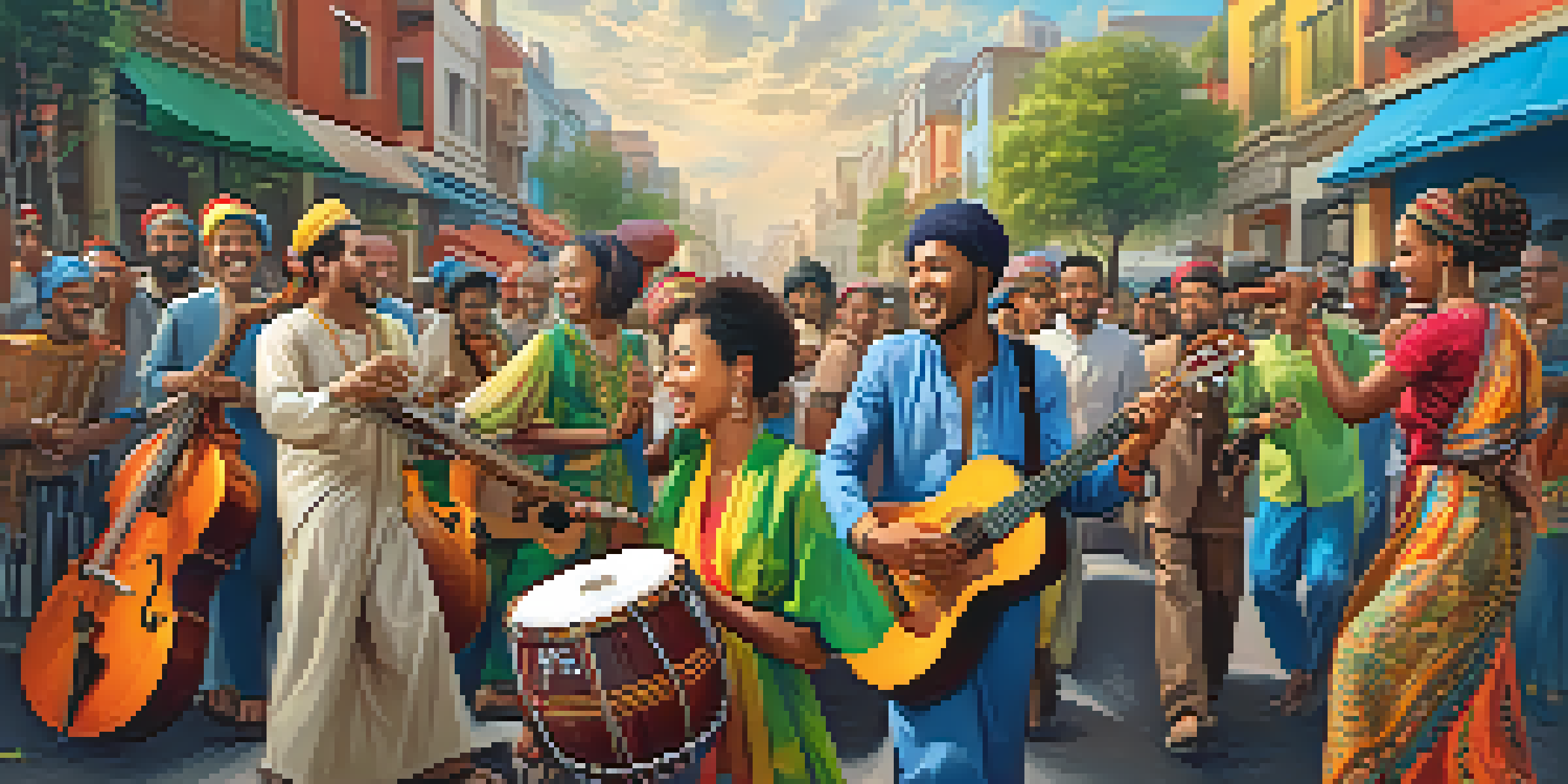The Impact of Globalization on Digital Music Markets

Understanding Globalization in the Music Industry
Globalization refers to the interconnectedness of economies, cultures, and societies through trade, technology, and communication. In the music industry, this means artists and songs can reach audiences worldwide, transcending geographical boundaries. For example, a pop song from South Korea can become a global hit, illustrating how cultural exchange is facilitated by digital platforms.
Music is the universal language of mankind.
As digital music streaming services like Spotify and Apple Music gain popularity, they enable listeners to explore music from diverse backgrounds. This democratization of music creates opportunities for artists from various regions to showcase their talent on a global stage. It’s fascinating to see how local sounds and styles can resonate with audiences far beyond their origin.
However, this rise of global music accessibility also raises questions about cultural appropriation and authenticity. As music becomes more homogenized, some worry that unique regional sounds may be overshadowed, leading to a loss of cultural identity. Balancing global influence while preserving local music traditions is a challenge that the industry continues to navigate.
The Role of Digital Platforms in Music Distribution
Digital platforms have revolutionized how music is distributed and consumed. Previously, artists relied heavily on record labels and physical sales to reach audiences. Now, platforms like YouTube, SoundCloud, and Bandcamp allow independent artists to share their music without intermediaries, creating a more equitable music landscape.

These platforms also provide invaluable data analytics for artists and marketers. By analyzing listener demographics and preferences, artists can tailor their marketing strategies to effectively engage their target audience. This data-driven approach helps musicians optimize their reach and connect better with fans worldwide.
Globalization Transforms Music Access
Digital platforms enable artists to reach global audiences, transforming how music is consumed and appreciated worldwide.
Moreover, the global nature of these platforms means that a song can go viral in one region and then spread to others, creating an organic buzz. For instance, the viral hit 'Despacito' showcases how a song can achieve international success through digital sharing. This interconnectedness emphasizes how digital platforms play a pivotal role in shaping the global music industry.
Shifts in Consumer Behavior Due to Globalization
Globalization has significantly influenced consumer behavior in the music industry. With access to a vast array of music from around the world, listeners are more open to exploring new genres and artists. This shift has broadened musical tastes and encouraged a more diverse listening experience among consumers.
The beauty of music is that it transcends language and culture.
Streaming services have made it easier than ever for fans to discover international artists. Playlists featuring global hits or curated selections from different cultures allow listeners to experience music they may never have encountered otherwise. This exposure fosters appreciation for various musical styles and traditions, enriching the overall music scene.
However, this shift also means that local artists face stiffer competition from international stars. As consumers have more options, it can be challenging for emerging local talent to gain visibility. Finding ways to stand out and connect with audiences has become more critical than ever for artists navigating this global landscape.
The Rise of Collaborative Music Projects
Collaboration is a hallmark of the global music scene today. Artists from different countries and backgrounds often come together to create unique sounds that blend their cultural influences. This trend not only enriches the music but also fosters a sense of global community among musicians.
For instance, collaborations like 'Old Town Road' by Lil Nas X and Billy Ray Cyrus showcase how genres can merge to create new musical experiences. Such projects highlight the creative possibilities that globalization offers, allowing artists to experiment and innovate in ways that resonate with diverse audiences.
Collaborative Projects Enhance Diversity
Artists from different cultures are increasingly collaborating, creating unique sounds and fostering a global community in music.
These collaborations can also enhance an artist's visibility in international markets. By partnering with well-known musicians from other countries, artists can tap into their collaborators’ fan bases and gain exposure to new listeners. This interconnectedness in music creation reflects the broader trends of globalization and its impact on the industry.
Challenges Faced by Local Artists in a Global Market
While globalization opens doors, it also presents challenges for local artists. With the influx of international music, local talent may struggle to find their place in the market. Competing with well-funded artists from major markets can be daunting, especially for those just starting out.
Moreover, the dominance of a few major labels in the global market can stifle diversity. These labels often prioritize mainstream hits, leaving little room for niche or independent artists. This imbalance can lead to a homogenization of music, where only certain sounds and styles are promoted, potentially sidelining unique local voices.
To combat these challenges, local artists must leverage digital platforms to build their own audiences. By utilizing social media and engaging directly with fans, they can create loyal followings and carve out their own space in the competitive global music landscape. Resilience, creativity, and strategic marketing are key for local artists aiming to thrive in this environment.
Cultural Exchange and Its Impact on Music Genres
Globalization facilitates cultural exchange, which significantly impacts the evolution of music genres. As artists incorporate diverse influences into their work, new hybrid genres emerge, reflecting the interconnectedness of cultures. For example, genres like reggaeton blend Latin rhythms with hip-hop influences, creating a sound that resonates with audiences worldwide.
This blending of styles not only enriches the music but also fosters understanding and appreciation between cultures. When listeners engage with music from different backgrounds, they gain insight into the stories and traditions that shape those sounds. This cultural exchange enhances empathy and connects people across borders through shared musical experiences.
Local Artists Face Global Competition
While globalization offers opportunities, local artists must navigate intensified competition and market challenges from international stars.
However, it’s essential to approach this cultural exchange thoughtfully. Artists must be mindful of respecting the origins of the music they draw from, avoiding cultural appropriation. Striking a balance between inspiration and respect is crucial for fostering a music landscape that celebrates diversity while honoring its roots.
The Future of Digital Music in a Globalized World
As globalization continues to shape the music industry, the future of digital music looks promising yet complex. The ongoing advancement of technology, such as artificial intelligence and virtual reality, presents new opportunities for artists to engage with their audiences. Imagining immersive concert experiences from the comfort of home could revolutionize how fans connect with their favorite musicians.
Furthermore, the rise of blockchain technology introduces possibilities for better artist compensation and rights management. By enabling direct transactions between artists and fans, blockchain can help ensure that creators receive fair payment for their work. This shift could address some of the longstanding issues artists face in navigating the digital landscape.

Ultimately, the future of digital music will likely be characterized by increased collaboration, innovation, and a heightened focus on artist rights. As artists and consumers navigate this globalized world together, the music industry will continue to evolve, reflecting the diverse tapestry of human experience through sound.